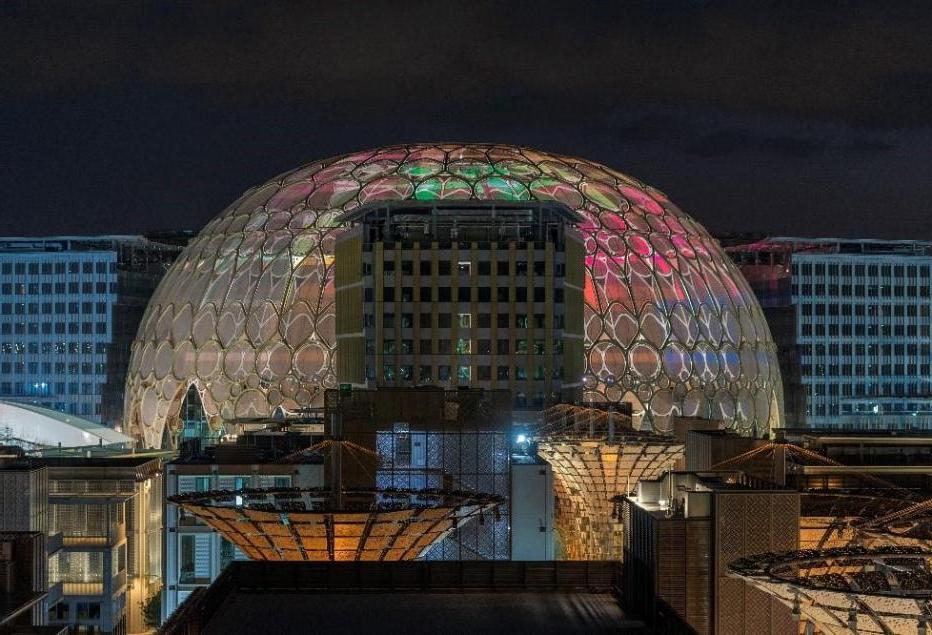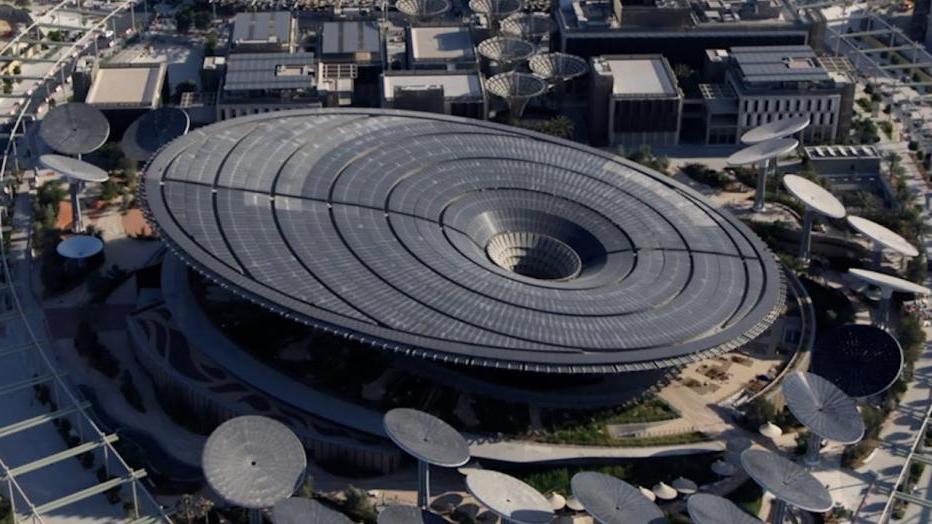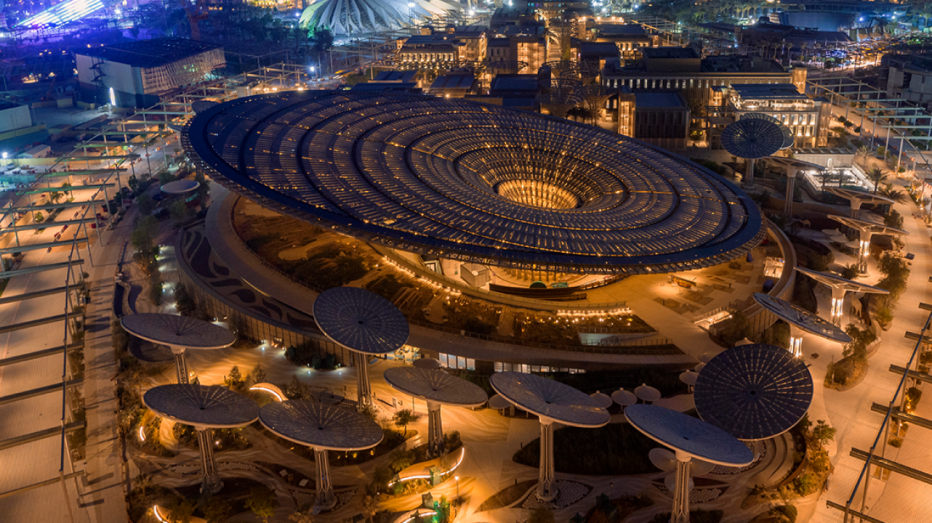
Since The Great Exhibition of the Works of Industry of all Nations of 1851 in London, U.K., World Expos have become some of the planet’s largest mega-events, attracting millions of visitors.
Commencing October 1, 2021, the largest event ever to be staged in the Arab world included more than 190 Country Pavilions featuring interactive exhibits, entertainment, memorable meeting spaces and more. Through its theme ‘Connecting Minds, Creating the Future’ and subthemes Opportunity, Mobility and Sustainability, Expo 2020 Dubai offered a global platform to foster creativity, innovation and collaboration.
The Expo site spans 438 hectares, including a 200-hectare gated area, and was open for six months, from October 1, 2021 to March 31, 2022. The successful delivery of Expo reinforced Dubai's role as a leading tourism and investment hub and global city in the region. This aligned with the UAE’s Golden Jubilee in 2021, celebrating 50 years of the UAE.
From Desert to Delivery
Jacobs first began working with Expo 2020 Dubai in 2015 and delivered the program as a joint venture with Mace (Jacobs Mace JV). As Program Management Consultant, the JV assisted Expo in managing numerous individual projects that ran 24/7 including design management, urban planning and design, program baselines and controls, procurement services, construction project management, site logistics and cost control. Jacobs leveraged its experience delivering successful major programs such as the London 2012 Olympic and Paralympic Games, bringing world-class experience and global best practices to Dubai.
Our team of visionaries, thinkers and doers employed comprehensive program management solutions to deliver a successful Expo event. From detailed site logistics to expert stakeholder engagement, we managed the program to deliver the highest quality while meeting budget and rigorous scheduling requirements.
From the outset, our delivery team sought to identify efficiencies during the master planning stage that would enhance the visitor experience during event time and minimize effort and cost in transitioning the site to legacy. This included initiatives such as optimizing pedestrian movement through the site to reduce walking times and ease movement between transport nodes and entrances; smart ways of using passive shading and retractable shade structures instead of expensive and more energy intensive outdoor cooling systems; and minimizing the effort and cost required in the conversion between event-time pedestrian concourses and shared pedestrian roads in legacy, an approach that is unique in Dubai.
There was also a strong focus on value engineering – like our solution for traffic maintenance and temporary roads during construction, where our team proposed converting temporary roads into more permanent roads. Having more robust, permanent roads has saved money and time, and improved delivery reliability. Smooth roads also reduce the likelihood of damage to materials as they travel to the site, further saving time and resources.
-
4.38
The size in km2 of the Expo 2020 Dubai site
-
1 st
World Expo to be held in the MEASA region
-
> 24 m
Visitors during the six-month event
-
80 %+
of the infrastructure & built environment retained in Expo City Dubai
“Jacobs Mace has proven to be a solid partner, playing an essential role in ensuring that construction is on track. Delivering an event of such enormous scale takes a collaborative effort and is only achievable by sharing knowledge and making continuous improvements side by side with our partners.”

Redefining Sustainable Program Management
To support Expo 2020 to deliver on their objective to host “one of the most sustainable World Expos in history,” Jacobs defined a sustainability strategy focused on three key objectives:
- To integrate sustainability into all aspects of the program from the design and construction of the site, through the event operations, and transition into its legacy city.
- To ensure that Expo 2020 Dubai embraces the opportunity to make a meaningful impact extending beyond the site and beyond the six months of the event.
- To inspire all visitors to become part of the solution for a sustainable future.
This strategy not only supported Sustainability as a subtheme of Expo, but also aligned to the objectives of the Dubai Plan 2021, the UAE Vision 2021 and the United Nations’ 2030 Agenda for Sustainable Development.
Sustainable urban development principles informed our approach at each stage of delivery; from the design and construction of the base build, temporary construction and overlay used during the Expo event and legacy transition planning which has enabled Expo to achieve global recognition for sustainable infrastructure.
Expo’s Sustainability Achievements
Leadership in Energy and Environmental Design (LEED) certification provides a framework to assess resource efficient green buildings based on various green building strategies employed in their delivery. 123 buildings in total achieved (LEED) certification: seven Platinum; 105 Gold; nine Silver; and two Certified.
Expo also adhered to the Building Research Establishment Environmental Assessment Methodology (BREEAM) (previously Civil Engineering Environmental Quality Assessment & Award or CEEQUAL) sustainability rating system and through its evidence-based sustainability assessment rating and awards scheme, achieved an Excellent certification for site infrastructure and public realm spaces. This is the highest possible rating given by an internationally recognized sustainability assessment for civil engineering and a first for a project in the Middle East.
-
123
Leadership in Energy and Environmental Design (LEED) certified buildings, including 105 buildings LEED-Gold and seven LEED-Platinum.
-
98 %
of key materials used in construction were procured in accordance with Sustainable Material Guidelines which encouraged responsible and regional sourcing of materials, using reused materials or materials with a high recycled content.
-
88 %
of construction waste diverted from landfill.
-
93 K
meals served to those in need through the Food Rescue Programme.
-
53 %
reduction in water demand in buildings, as compared to local codes and standards – a saving of 102,835,000 liters per year – the equivalent of 41 Olympic sized swimming pools.
-
15 %
reduction in GHG emissions from the “business-as-usual” scenario, incorporating a 10% reduction delivered via sustainable mitigation strategies and an additional 5% reduction delivered through carbon offsets.
Minimizing Expo’s carbon footprint was a key component of organizers commitment to the Bureau International des Expositions – the global organization responsible for overseeing and regulating World Expos.
Our team supported Expo to develop a multi-year greenhouse gas emissions inventory to assess the total environmental impact of the event. This analysis considered all impacts that were created as a consequence of the Expo, using multiple standards and protocols.
Hosting a World Expo is a monumental effort. Irrespective of location, the event requires a great deal of planning, integration and construction or modification of venues to ensure a successful event. Most of Expo’s emissions stemmed from three core activities:
- Transporting people, goods and construction materials to and from the Expo site.
- Constructing venues and associated infrastructure improvements, including the “embodied carbon” from production of concrete, steel and other materials, as well as the fossil fuel used onsite by construction vehicles.
- Energy used during the planning, construction and operations of the Expo 2020 site and hosting of the event.
We further supported Expo to implement a program to reduce and offset their carbon footprint. Our innovative visitor-centric alternative to traditional carbon credit purchase saw key stakeholders and visitors engaged to nominate and decide which carbon credit projects Expo will support.
Expo developed a comprehensive emissions inventory that included sources both within and outside its direct control. It’s final carbon inventory results demonstrated a 15% reduction in emissions from the business-as-usual scenario based on its total emissions footprint despite the operational challenges presented by COVID-19.
The cumulative impact of Expo’s approach was delivering “one of the most sustainable World Expos in history.” Organizers have created a blueprint for how to plan, design and deliver a sustainable World Expo event and set a new performance benchmark for future events. In doing so it has also created a sustainable legacy for Dubai and the United Arab Emirates.

Health, Safety and Worker Welfare
Expo is a landmark program for safety in the region. From the onset, safety and worker welfare have been top priorities. In fact, approximately 30% of our safety efforts move beyond basic requirements to raise the quality of worker welfare, with the intention to raise worker welfare standards in the region.
Jacobs led development of the ‘Promises’ campaign in collaboration with the Expo Dubai team and associated stakeholders and implemented it across the Expo program to increase the awareness of key behaviors that lead to serious injuries and fatalities.
This campaign not only targeted the frontline worker on the site, but also placed a particular emphasis on organizations associated with this program promising to provide an environment through which safe behaviors can be followed. The Jacobs Critical Risks (unsafe behaviors which could lead to serious injuries or fatalities) were used as a basis for the campaign, and through extensive consultation with the senior health and safety practitioners across the program, the relevant significant hazards and associated Promises behaviors were defined.
As a key feature of campaign deployment, we developed a series of interactive stage performances (plays) as an innovative tool to communicate the Promises to the workforce. Through this Visual Impact Training (VIT), the performances provided a practical, interactive theatre-style production in which frontline workers learn how to create a safe environment and understand the consequences when things go wrong. The performances were normally divided into two parts: Unsafe behaviors resulting in a serious injury and safe behaviors resulting in successful completion of an activity.
Since the launch of the VITs, over 12,500 frontline workers have been successfully trained in identifying hazards and maintaining a safe site. A study to evaluate the effectiveness of the VIT revealed that participants who had attended the Expo VIT were 2.6 times more likely to recall a critical behavior than those who had not attended the VIT.
The work on the Promises behaviors continues to evolve and provides an effective vehicle for deploying future health and safety interventions. To this extent, we expanded Promises to include behaviors aligned to our mental health and wellbeing strategy.
In addition to consistent engagement and site visits, our Health, Safety and Environment (HSE) team oversaw the development of a worker welfare app to empower workers on the Expo site. The Worker Connect App is aligned to Jacobs’ commitment to create a Culture of CaringSM and provided an anonymous platform for workers to report poor or unsafe working conditions in multiple languages such as Hindi, Bangla, Malayalam, Arabic, Tamil, Urdu and Nepali. If workers don’t own a smartphone, the team circulated tablets around the site for common use and access to the app.
The app enabled the Jacobs delivery team to monitor the conditions of worker welfare across the Expo 2020 program, covering approximately 35,000 workers from about 1,200 individual contracting entities.
In addition, the app served an educational purpose providing workers with information that outlined their rights enshrined under UAE laws, including information about timely wage payments, prevention of excessive working hours and provision of safe and healthy living and working environments.
Since its inception the app highlighted several safety challenges, which were all quickly addressed to uphold a safe and healthy environment.

An Enduring Legacy
One of the key objectives outlined in the bid to host Expo 2020 was to build a legacy with a global destination that offered a new alternative for urban living. More than 80% of the physical infrastructure has been retained and the site transformed into an innovation-driven and people-centric city of the future - Expo City Dubai (Expo City).
Expo City’s sustainability strategy builds on the legacy of Expo 2020 Dubai and is targeting net zero by 2050.
Having worked closely with Expo 2020 Dubai since 2015, it was natural for Jacobs to continue to support the transition and evolution of Expo City Dubai. We’re continuing to support as the Programme Manager, as well as providing strategic support in a number of areas to help shape the sustainability strategy and decarbonization roadmap.
More videos
The crowning of Al Wasl Plaza: http://www.youtube.com/watch?v=n02P3DMgooU
The Expo 2020 Architectural marvels: http://www.youtube.com/watch?v=b0SSuA-4I3o
You might also be interested in...
Jacobs at COP28: http://ue0p.go-rutgers.com/jacobs-cop28
Partnership announcement: http://www.expo2020dubai.com/en/whats-new/20190624-jacobs-mace
Crowning of Al Wasl: http://www.expo2020dubai.com/en/whats-new/20190918-alwasl-crowning
-
 Report
ReportPioneering a Net Zero City with Expo City Dubai
Expo City Dubai is taking bold action to create a resilient, low-carbon city that enhance the quality of life for residents and protects the environment. Explore this real-world example of how sustainable urban living can be achieved.
-
 Report
ReportNet Zero Cities
Jacobs releases new thought leadership paper that asks the question: What if city stakeholders used a programmatic approach, looking beyond traditional project and asset boundaries, to co-develop solutions that reduce carbon AND address the most urgent and aspirational needs of the community?

















































